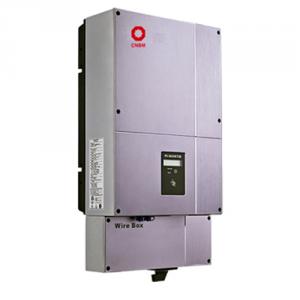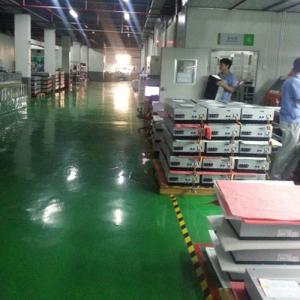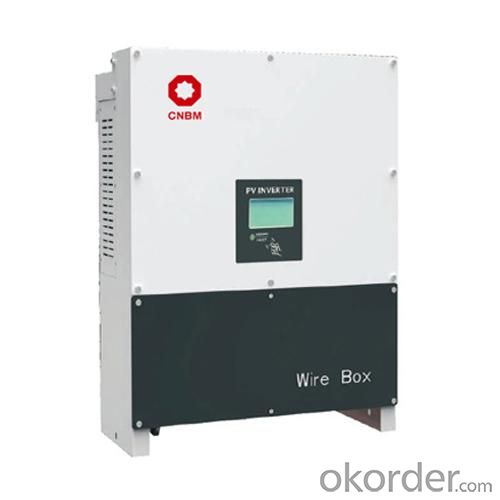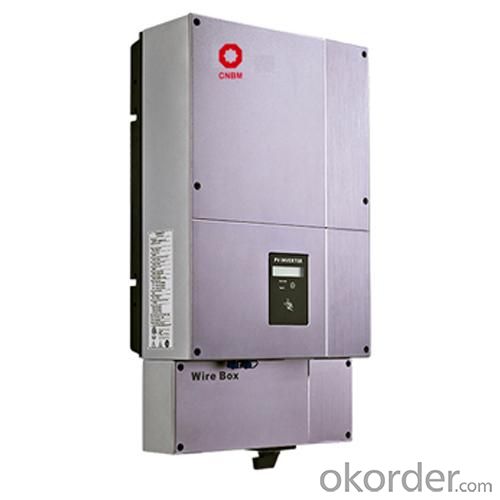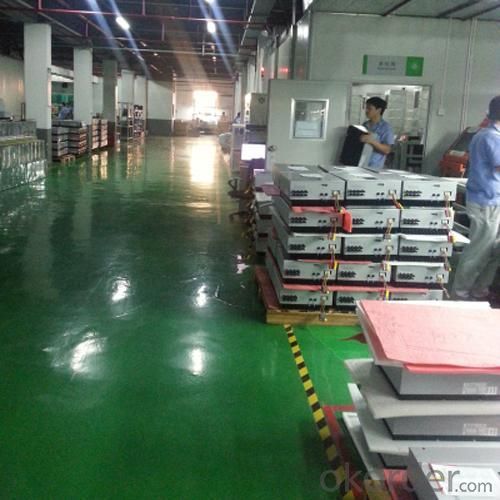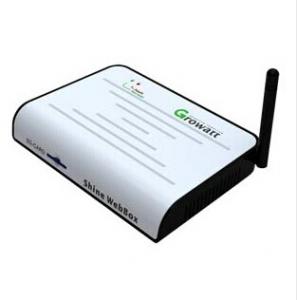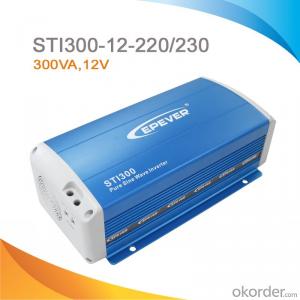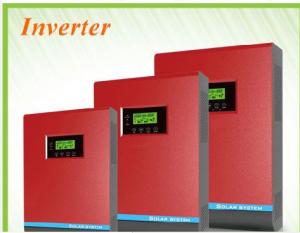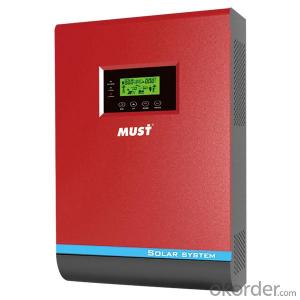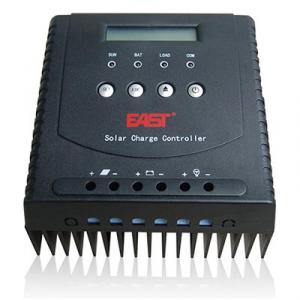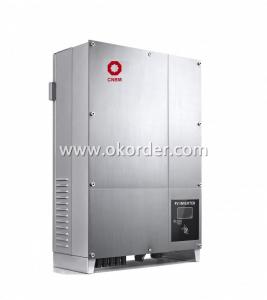3000W Grid Tied Solar Inverter 3-Phase 12000W
- Loading Port:
- Shenzhen
- Payment Terms:
- TT or LC
- Min Order Qty:
- 1 unit pc
- Supply Capability:
- 5000Units/per month pc/month
OKorder Service Pledge
OKorder Financial Service
You Might Also Like
Grid Tied Solar Inverter 3-phase 12000W
CNBM International Corporation (CNBM International) is the most important trading platform of CNBM Group Corporation, a state-owned company under the direct supervision of State-owned Assets Supervision and Administration Commission of the State Council.
With a R&D team more than 100 engineers,40% of the staff, who has been deeply engaged in the photovoltaic industry for 10 years, CNBM takes the mission to increase the inverter availability and efficiency, putting continuous innovation to make CNBM inverter easier for installation and operation, and more cost-effective for solar plant construction. The full range of CNBM single phase inverters has received VDE, CE, G83/1, G59/2, ENEL2010, VDE4105, C10/C11, AS4777 etc.
Maximum efficiency of 97.8% and wide input voltage range, Internal DCswitch,MTL-String, Sound control,Bluetooth/RF technology /WiFiTransformerless,GT topology
The Grid Connected Solar Inverter we can offer is 1.5kw to 20kw.
Introduction of Grid Tied Solar Inverter 3-phase 12000W
Maximum efficiency of 97.8% and wide input voltage range
Integrated DC switch-disconnected
MTL-String
Sound control
Bluetooth/RF technology /Wi-Fi
Transformerless GT topology
5 years warranty (10years as optional)
Datasheet of Grid Tied Solar Inverter 3-phase 12000W
Model | 10000TL3-US | 12000TL3-US | 18000TL3-US | 20000TL3-US |
Input data(DC) | ||||
Max. DC Power | 10500W | 12500W | 18750W | 20850W |
Max. DC voltage | 600V | 600V | 600V | 600V |
Start voltage | 120V | 120V | 120V | 120V |
PV voltage range | 80V-600V | 80V-600V | 80V-600V | 80V-600V |
Max. input current of the MPP tracker A/tracker B | 21A/21A | 25A/25A | 38A/38A | 42A/42A |
Number of MPP trackers/strings per MPP tracker | 2/3 | 2/3 | 2/6 | 2/6 |
Output data(AC) | ||||
Nominal output power | 10000W | 12000W | 18000W | 20000W |
Nominal AC voltage | 480V | 480V | 480V | 480V |
AC voltage range | 422-528VAC | 422-528VAC | 422-528VAC | 422-528VAC |
Nominal AC grid frequency | 60 Hz | 60 Hz | 60 Hz | 60 Hz |
Max. output current(cos φ=1) | 12.0A | 14.5A | 21.5A | 24A |
Power factor(cos φ) | >0.99 | >0.99 | >0.99 | >0.99 |
Harmonics | <3% | <3% | <3% | <3% |
Grid connection type | 3/N/E | 3/N/E | 3/N/E | 3/N/E |
Efficiency | ||||
Max. efficiency | 97% | 97% | 97.5% | 97.5% |
CEC-Weighted efficiency | 95.5% | 95.5% | 96% | 96.5% |
MPPT efficiency | 99.5% | 99.5% | 99.5% | 99.5% |
Protection devices | ||||
Input over voltage protection -DIN rail surge arrester(Option) | Class II | Class II | Class II | Class II |
DC insulation measure | yes | yes | yes | yes |
AC short circuit protection | yes | yes | yes | yes |
Output over voltage protection -Varistor | yes | yes | yes | yes |
Output over voltage protection -DIN rail surge arrester(Option) | Class II | Class II | Class II | Class II |
String fuse type/size(Option) | 15A/600VDC 10*38mm | 15A/600VDC 10*38mm | 15A/600VDC 10*38mm | 15A/600VDC 10*38mm |
General Data | ||||
Dimensions(W*H*D) in mm | 530*705*247 | 530*705*247 | 650*740*247 | 650*740*247 |
Weight | 46kg/101.5lb | 46kg/101.5lb | 63kg/138.9lb | 63kg/138.9lb |
Operating ambient temperature range | –25°C ... +60°C | –25°C ... +60°C | –25°C ... +60°C | –25°C ... +60°C |
Altitude | ≤2000m/6560ft | |||
Self Consumption night | < 3 W | < 3 W | < 3 W | < 3 W |
Topology | Transformerless | |||
Cooling concept | Fan Cool | Fan Cool | Fan Cool | Fan Cool |
Electronics protection rating /connection area | NEMA 3R | NEMA 3R | NEMA 3R | NEMA 3R |
Features | ||||
Display | Graphic | Graphic | Graphic | Graphic |
Interface:RS232/RS485/ Bluetooth/RF/Zigbee/Wifi | yes/yes/opt/opt /opt/opt | |||
Warranty:10 years /15 years | yes/opt | yes/opt | yes/opt | yes/opt |
Certificates and approvals | UL1741,UL1998,IEEE1547,FCC part 15(class B),CSA C22.2 No.107.1 | |||
Picure1: Factory of Grid Tied Solar Inverter 3-phase 12000W
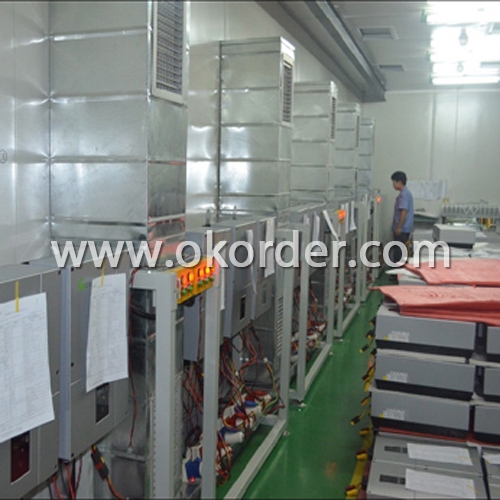
Picture 2: Package of Grid Tied Solar Inverter 3-phase 12000W
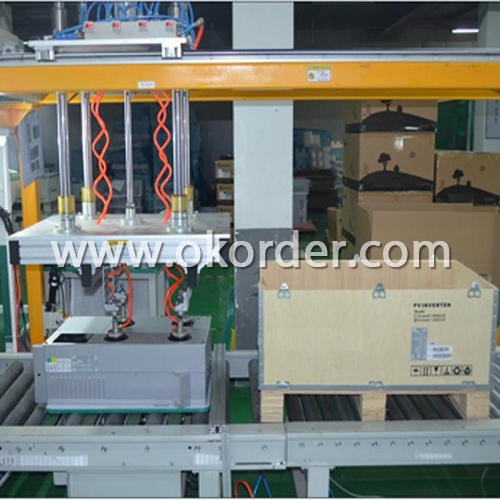
- Q: What is the impact of temperature on the performance of a solar inverter?
- The impact of temperature on the performance of a solar inverter is significant. High temperatures can cause the efficiency of the inverter to decrease, resulting in a reduction in power output. This is due to the fact that electronic components inside the inverter operate less efficiently at high temperatures. Additionally, elevated temperatures can lead to increased thermal stress on the inverter, potentially shortening its lifespan. Therefore, it is important to carefully consider the temperature conditions and provide adequate cooling or ventilation for optimal performance and longevity of the solar inverter.
- Q: Can a solar inverter be used with a solar-powered air conditioner?
- Yes, a solar inverter can be used with a solar-powered air conditioner. A solar inverter converts the direct current (DC) produced by solar panels into alternating current (AC) which is required to power the air conditioner. By using a solar inverter, the solar power generated can be utilized efficiently to run the air conditioner, making it a sustainable and cost-effective solution for cooling.
- Q: What is the role of a frequency regulation feature in a solar inverter?
- The role of a frequency regulation feature in a solar inverter is to maintain a stable and consistent frequency of the electrical output, ensuring compatibility with the grid or connected appliances. This feature helps to mitigate fluctuations in frequency caused by varying solar irradiance or load fluctuations, thereby improving the overall efficiency and reliability of the solar power system.
- Q: What is the difference between a PV grid-connected inverter and an off-grid inverter?
- Grid-connected inverter does not need energy storage, but the energy can not be controlled, the number of photovoltaic sent to send online how much, simply do not want people to.
- Q: Can a solar inverter be used with a solar air conditioning system?
- Yes, a solar inverter can be used with a solar air conditioning system. The solar inverter helps convert the DC power generated by the solar panels into AC power that is suitable for powering the air conditioning system. This allows for the utilization of solar energy to cool or heat a building, making it an eco-friendly and energy-efficient solution.
- Q: Can a solar inverter be used with a ground-mounted solar panel system?
- Yes, a solar inverter can be used with a ground-mounted solar panel system. The solar inverter is responsible for converting the DC power generated by the solar panels into AC power that can be used to power household appliances or fed back into the electrical grid. Whether the solar panels are mounted on the ground or on a rooftop, the inverter plays a crucial role in ensuring the efficient and effective utilization of the solar energy generated.
- Q: How does a solar inverter protect against overvoltage or overcurrent?
- A solar inverter protects against overvoltage or overcurrent by constantly monitoring the electrical output from the solar panels. It uses built-in protection mechanisms such as surge protectors, voltage regulation circuits, and current limiters to prevent the voltage or current from exceeding safe levels. If an overvoltage or overcurrent event occurs, the inverter will automatically shut down or reduce the output to protect the system and connected devices from potential damage or failure.
- Q: How does a solar inverter interact with a battery storage system?
- A solar inverter interacts with a battery storage system by converting the direct current (DC) generated by the solar panels into alternating current (AC) that can be used to power household appliances or be fed back into the grid. It also manages the charging and discharging of the battery, ensuring efficient energy storage and utilization.
- Q: What are the key considerations for selecting a reliable solar inverter manufacturer?
- When selecting a reliable solar inverter manufacturer, there are several key considerations to keep in mind. Firstly, it is important to assess the manufacturer's reputation and track record in the industry. Look for manufacturers with a solid history of producing high-quality and durable inverters. Secondly, evaluate the manufacturer's warranty and after-sales support. A reliable manufacturer should offer a comprehensive warranty that covers both the product and its performance. Additionally, they should have a responsive customer support team that can assist with any inquiries or issues that may arise. Thirdly, consider the efficiency and performance of the inverters offered by the manufacturer. Look for inverters that have high conversion efficiency, which can maximize the solar energy generation and optimize the system's overall performance. Furthermore, it is crucial to assess the manufacturer's compliance with industry standards and certifications. Look for manufacturers that adhere to recognized quality standards and have certifications such as ISO 9001 and IEC 62109. Lastly, consider the manufacturer's financial stability and longevity. A reliable manufacturer should have a strong financial standing and be well-established in the market. This ensures their ability to honor warranties and provide ongoing support. By considering these key factors, you can select a reliable solar inverter manufacturer that offers high-quality products, excellent customer support, and a strong reputation in the industry.
- Q: Can a solar inverter be used in conjunction with a wind turbine?
- Yes, a solar inverter can be used in conjunction with a wind turbine. Both solar and wind energy sources produce direct current (DC) electricity, which needs to be converted to alternating current (AC) for use in homes and businesses. A solar inverter is designed to convert DC electricity generated from solar panels into AC electricity, and it can also be utilized to convert the DC electricity generated by a wind turbine into usable AC electricity. By integrating a solar inverter, the electricity generated by both the solar panels and wind turbine can be synchronized and fed into the electrical grid or used directly on-site.
Send your message to us
3000W Grid Tied Solar Inverter 3-Phase 12000W
- Loading Port:
- Shenzhen
- Payment Terms:
- TT or LC
- Min Order Qty:
- 1 unit pc
- Supply Capability:
- 5000Units/per month pc/month
OKorder Service Pledge
OKorder Financial Service
Similar products
Hot products
Hot Searches
Related keywords

